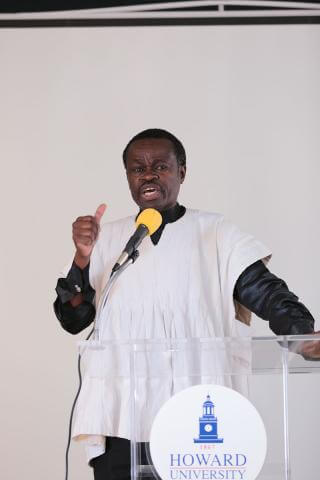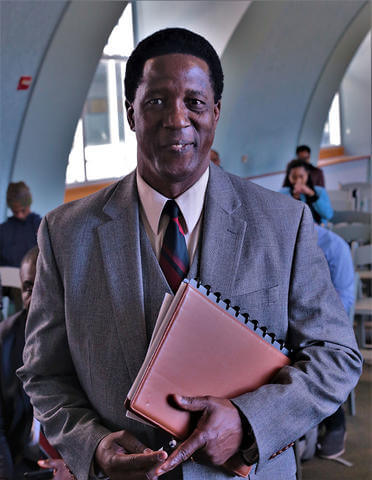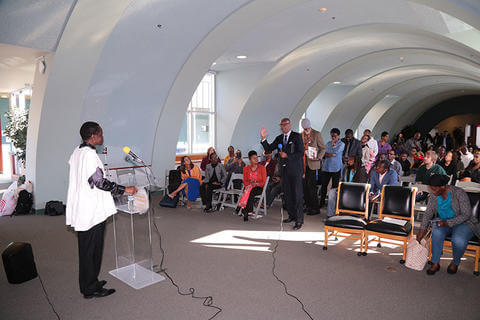Dr. PLO Lumumba on the Role of Africa and the Black Diaspora in International Affairs

By Constance Pruitt
October 18, 2018
The Palavar Series’ presented a public lecture on Africa and Black Diasporic Engagements featuring renowned Dr. PLO Lumumba. The event took place from 2:00 to 4:00 pm on Thursday, October 18, 2018, in the Louis Stokes Health Sciences Library at Howard University. The public lecture, “On the Role of Africa and the Black Diaspora in International Affairs” was hosted by Dr. J. Jarpa Dawuni of the Political Science Department and Dr. Msia Kibona Clark of the African Studies Department.
Dr. Mohamed Saliou Camara, Chair of the African Studies department, provided the welcome address. Next, Ayana Gregory, daughter of the late Dick Gregory, gifted the audience with an inspiring and interactive opening song, reminding the audience that, “We are the ones that we have been waiting for for…. We are qualified.” Dr. Dawuni then gave a brief introduction of Dr. Lumumba, the renown Kenyan lawyer, Pan-Africanist and public speaker, calling him “a great son of Kenya, greater son of Africa, and an even greater Pan-Africanist.”
Dr. Lumumba expressed his enthusiasm to speak at Howard University and share his thoughts on a subject that is very important especially on the history of Africa. He discussed the popular but often misguided conversations around the Black diaspora that focuses solely on slavery, colonization, or its independence era. Instead, Lumumba insisted that we should look at how Africa is today and the disbursement of its sons and daughters throughout the world. He stated that Africa is attractive to many players on the global stage, then posed to the audience the question of why. What is it in Africa that people seek? He noted, that Africa is becoming an economic and political mecca and has a bright future ahead.
Additionally, he discussed the strength of the black diaspora’s diversity. Divisive factors, such as assimilation, has put a toll on the continent and its disbursement. As long as the black diaspora remains disorganized, it will not be successful. Instead, the diaspora should look to how it can work together to reinvigorate the spirit of Martin Luther King Jr. W.E.B Dubois, Marcus Garvey, among others, to make Africa the mecca for where the diaspora convenes to celebrate its diversity and to discuss political and economic affairs.
Africa, the richest place on the earth, remains the poorest continent on earth. Lumumba urged the audience to ask themselves, what can we do? He posed a challenge, that the Black diaspora ensures the progress in Africa, by improving its environment, instating education that addresses and informs well-being, creating better medical facilities, and producing its own food. He holds the view that the Black diaspora can achieve that.
Furthermore, he argues that the diaspora needs to tell its own story of Africa to change the narrative. When analyzing the Africa problem, we often speak like nothing good is happening in Africa, which is false. He believes that Africa will be at the forefront of the fourth industrial revolution. He further highlighted the great things happening within the continent, such as in Ethiopia, where he gave an example of how Ethiopians are moving towards industrialization— roasting their own coffee and developing their own airline. Now Botswana enjoys an economic surplus and great things are happening in Rwanda, Kenya, Ghana, and still in Nigeria, despite setbacks. With these examples, he posed the question, “who knows when the tipping point will arrive?”
In conclusion, he noted that the relationship between Africa and its Black diaspora is critical for the continent’s next phase of growth and development, noting that “to discover new islands, one must lose sight of the shores.” Africans are beginning to organize across the world, as international players pledge to invest in the continent. Dr. Lumumba believes the second half of the 21st century will be for Africa. He concluded by saying, “yes, we were enslaved, but we were never eliminated. We were colonized, but we were never subjugated. The neocolonial plan was against us, but we were never intimidated….We have remained resilient!”


